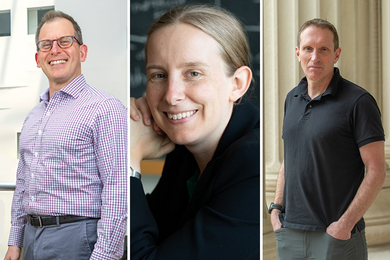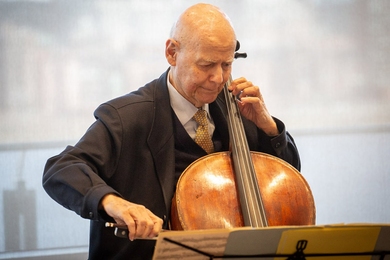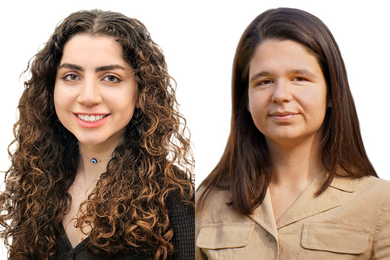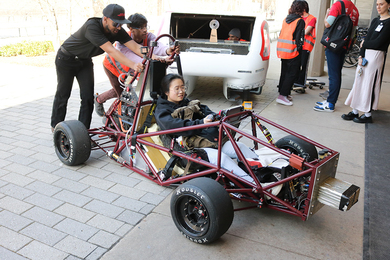Harbison's piece premieres before pope
Few are granted a papal audience; fewer still have a pope in their audience. Composer and Institute Professor John Harbison achieved both when his sacred motet, "Abraham," was premiered at a Papal Concert of Reconciliation attended by Pope John Paul II at the Vatican on Jan. 17.
The concert--which featured the Pittsburgh Symphony Orchestra and singers from the London Philharmonic Choir, the Krakow Philharmonic and the Ankara Polyphonic Choir--aimed to promote "the commitment to a peaceful coexistence among all the children of Abraham," according to its sponsors.
Harbison was commissioned to compose "Abraham" on the theme of "Reconciliation Between Jews, Christians and Muslims."
Speaking to The Capital Times of Madison, Wis., Harbison said he found the pope "an inspiring figure because of the intensity of the concentration and dedication he brought, despite old age and ill health, to the theme of peace in the Middle East and reconciliation among different faiths."
To see and hear a video of the concert, visit http://www.papal-concert-of-reconciliation.com.
Powell to give store readings
Patricia Powell, the 2004 Martin Luther King Jr. Visiting Professor of Writing, will read from her novels at Wordsworth Books at 30 Brattle St. in Cambridge tonight (Feb. 11) at 7 p.m., and at Jamaicaway Books & Gifts at 676 Centre St. in Jamaica Plain on Saturday, Feb. 28 at 3 p.m. Powell, who was born in Jamaica, grew up in England and immigrated to the United States with her family in 1982. She has written three novels exploring themes of gender, race and sexuality: "Me Dying Trial" (1993), "A Small Gathering of Bones" (1994) and "The Pagoda" (1998).
Ziporyn's "Be-In" wins praise
Kenan Sahin Distinguished Professor of Music Evan Ziporyn's composition "Be-In" and his bass clarinet playing are included on the eponymous debut album of the New York-based string quartet Ethel (Cantaloupe Music). Ziporyn's composition was called "the most gripping piece" on the recording by the London Guardian's John Walters. The work is "a hypnotic, spiraling nine-minute journey with a tender conclusion that's both intellectually demanding and emotionally satisfying," Walters wrote. Ziporyn's playing is also featured on "Sorcerer Sessions," a new CD by avant-garde jazz pianist Matthew Shipp (Thirsty Ear).
Ruckert publishes book on Indian music
Music and theater arts senior lecturer George Ruckert has published his fifth book, "Music in North India, Experiencing Music, Expressing Culture." The work is part of Oxford University Press' Global Music Series, in which each book focuses on a particular culture and comes with a CD. "North India" has 33 examples of music, from Vedic chant to modern pop, although most of the cuts are from the classical traditions of North India. Pictures, charts and exercises are augmented with quotes from Ali Akbar Khan, Ravi Shankar, Zakir Hussain and others.
DeFrantz completes first analysis of Ailey's work
Hot off the presses, "Dancing Revelations: Alvin Ailey's Embodiment of African American Culture" (Oxford University Press) by Associate Professor Thomas DeFrantz offers the first complete analysis of choreographer Alvin Ailey's body of work. Ailey died in 1989; he choreographed his signature piece, "Revelations," in 1960. DeFrantz wrote portions of his book during a residency at the Rockefeller Foundation Study Center in Bellagio, Italy.
Ruehr commissioned to write string quartet
Music and theater arts lecturer Elena Ruehr has been commissioned to write a string quartet for the Cypress Quartet, a San Francisco ensemble that commissions new works to complement standard repertoire. Ruehr has been asked to write a piece that responds to Mozart's "Dissonant Quartet" and Beethoven's Op. 59 #3. Ruehr, who has just started the composition, hopes to complete it by fall and then spend three weeks touring the Bay Area with the Cypress Quartet as they perform at a number of smaller venues before the formal premiere in San Francisco in spring 2005.
A version of this article appeared in MIT Tech Talk on February 11, 2004.





